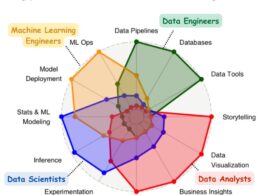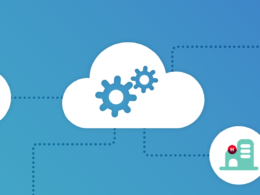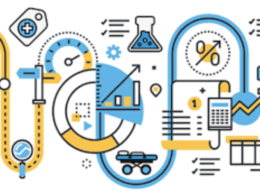This is an excerpt of the report below, focusing on the topic above. The publication is preceded by the key messages about the theme.
Healthcare’s Data Readiness Crisis
HEALTHCARE IT IN 2022: Triage vs. Transformation
Morning Consult survey for Innovaccer
April 2022
Excerpted by
Joaquim Cardoso MSc.
The Health Revolution Institute
Digital Health Unit
April 11, 2022
Key messages
- Certainly EHRs can be an essential component of optimizing care and sharing patient information in a way that’s collaborative and compliant.
- But they’re not a complete, integrated solution
- When you approach data optimization and activation as a one-off project vs. a foundational capability, it often leads to the undesired creation of yet another silo.
Executive Priorities: Triage vs. Transformation
Looking again at the platforms healthcare IT leaders have historically invested in, EHRs are far and away in the lead, with approximately 95% of all respondents reporting having already invested in them.
What’s more, more than 2 in 5 plan on continuing investment in EHR platforms over the next three years.
And more investment is planned for patient portals, revenue cycle management, CRM, and cloud migrations.
But as valuable as all these platforms are, not one addresses the underlying challenge of data readiness. All of them would yield much greater clinical, financial, and operation
…more investment is planned for patient portals, revenue cycle management, CRM, and cloud migrations.
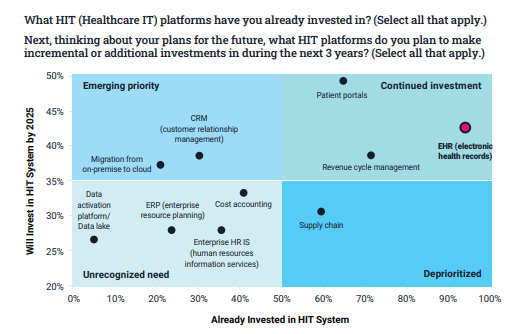
But as valuable as all these platforms are, not one addresses the underlying challenge of data readiness. All of them would yield much greater clinical, financial, and operation
… but the jury is divided on how helpful EHR vendors are when it comes to supporting data readiness.
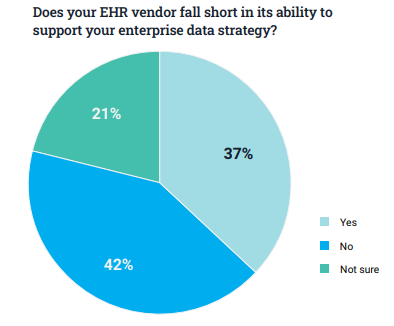
Only about 4 in 10 of the healthcare executives surveyed said they were happy with the role their EHR vendor plays in their enterprise data strategy. The rest either thought their EHR vendor fell short or they weren’t sure.
Only about 4 in 10 of the healthcare executives surveyed said they were happy with the role their EHR vendor plays in their enterprise data strategy.
Certainly EHRs can be an essential component of optimizing care and sharing patient information in a way that’s collaborative and compliant.
But they’re not a complete, integrated solution for optimizing and activating data and accelerating innovation across the enterprise.
Certainly EHRs can be an essential component of optimizing care and sharing patient information in a way that’s collaborative and compliant.
But they’re not a complete, integrated solution
And because they are intrinsically a data silo, they don’t promote data readiness, and they’re not a replacement for systemic interoperability across all of your HIT platforms.
Integration of HIT platforms largely falls to outside vendors …
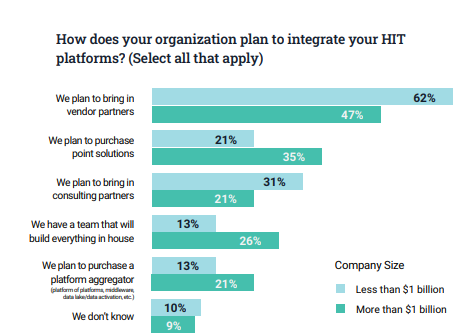
Healthcare executives deal with myriad HIT platforms, and most don’t communicate with each other. But integration is critical. To accomplish it, most healthcare organizations bring in outside vendors.
Healthcare executives deal with myriad HIT platforms, and most don’t communicate with each other. But integration is critical. To accomplish it, most healthcare organizations bring in outside vendors.
It’s not surprising. Doing it yourself has proven to be more expensive, massively inefficient, time consuming, and far more risky than bringing in a team of outside specialists.
In fact, many in-house attempts at integration never actually finish, and outside vendors are brought in to start fresh.
Many accidentally end up creating even more silos.
AGAIN, WHEN YOU APPROACH DATA optimization and activation as a one-off project vs. a foundational capability, it often leads to the undesired creation of yet another silo.
More fundamentally, it fails to address the crisis of data readiness that’s stifling innovation, hampering AI, and delaying transformation.
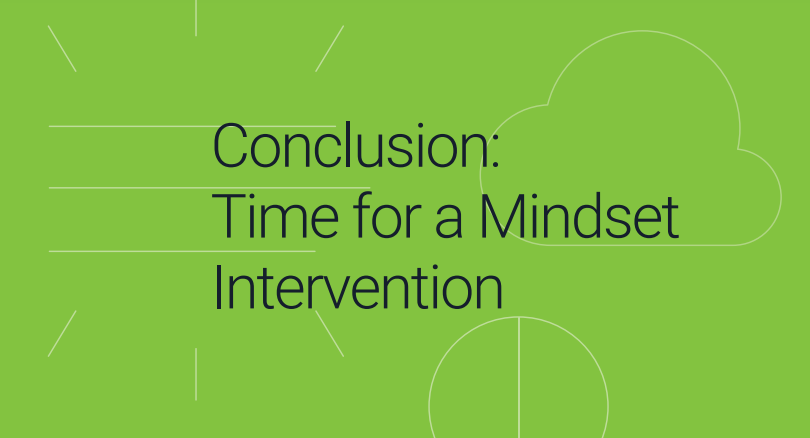
When it comes to accelerating innovation, getting un-stuck starts with asking yourself the right questions
What if you didn’t have to choose between near-term triage and long-term transformation?
What if instead of focusing on data integration as a project, you focused on achieving systemic interoperability, one step at a time?
What if your interoperability and AI weren’t hamstrung by a lack of data readiness?
What would that do for your ability to drive better clinical outcomes, drive operational efficiency, and boost financial performance?
What could that do for doctors, nurses, and care providers we all rely on to keep us healthy?
It’s time for a shift in thinking.
The Shift: Approach digital transformation from a “data readiness first” perspective
Healthcare’s challenges are deeply rooted in data problems. All across healthcare, clinical, claims, labs, pharmacy, and other data are trapped in disconnected systems within and across institutions.
Every day, these data silos grow more complex as exabytes of patient data continue to flow into them.
Healthcare’s challenges are deeply rooted in data problems.
Every day, these data silos grow more complex as exabytes of patient data continue to flow into them.
This data fragmentation severely impedes transformation. Embarking on new initiatives without first solving for data readiness simply kicks the transformation can down the road, and results in short-term fixes to long-term problems.
Without data readiness, a health system can’t establish the integrated workflow, analytical, care management, and risk management capabilities required to excel at value-based care, deliver exceptional consumer experiences, and improve health equity in our communities.
Without data readiness, a health system can’t establish the integrated workflow, analytical, care management, and risk management capabilities required to excel at value-based care, deliver exceptional consumer experiences, and improve health equity in our communities.
It’s time to unify and purify data across healthcare to make it complete, trustworthy, and actionable. We need to make data readiness “job one” — the bedrock on which all other transformative initiatives can thrive.
In doing so, healthcare leaders will find they can address their immediate needs while establishing a foundation for long-term, sustainable innovation.
It’s time to unify and purify data across healthcare to make it complete, trustworthy, and actionable. We need to make data readiness “job one” …
ORIGINAL PUBLICATION (excerpt)
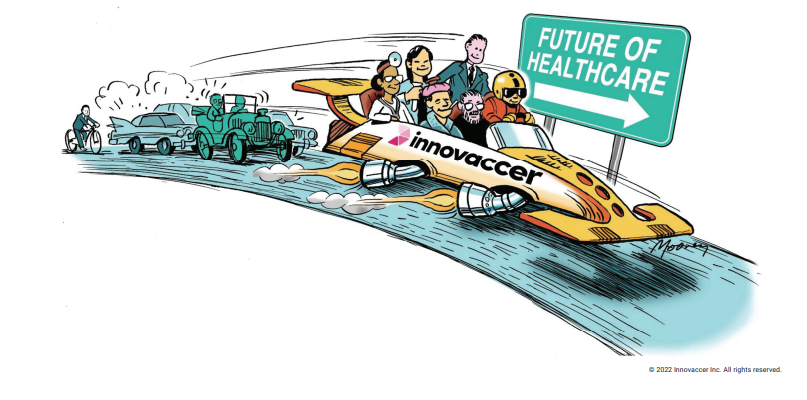
Healthcare’s Data Readiness Crisis
HEALTHCARE IT IN 2022: Triage vs. Transformation
Innovaccer, April 2022
Table of Contents (TOC)
- Executive Summary
- Healthcare Data Readiness in 2022
- AI and Digital Transformation Progress
- Executive Priorities: Triage vs. Transformation
- Conclusion: Time for a Mindset Intervention
- Methodology
Executive Summary
The Healthcare Data Readiness Crisis
THE MANDATE FOR HEALTHCARE to embrace digital transformation isn’t new. Healthcare executives have been struggling with digital transformation for years.
Then COVID-19 hit. Suddenly, the world was forced to embrace digital transformation in a matter of days, not decades. And healthcare was no exception.
THE MANDATE FOR HEALTHCARE to embrace digital transformation isn’t new. Healthcare executives have been struggling with digital transformation for years.
Then COVID-19 hit. Suddenly, the world was forced to embrace digital transformation in a matter of days, not decades. And healthcare was no exception.
Innovaccer recently commissioned the market researchers at Morning Consult to survey 75 healthcare leaders to understand how their organizations are navigating digital transformation within healthcare, and their overall outlook on digital transformation.
The responses reveal that the pandemic has made digital transformation the number one imperative for 2022 and the rest of the decade. Whereas the industry has had to content itself with incremental changes for years, now the challenge is to embrace change at a much faster pace.
…the pandemic has made digital transformation the number one imperative for 2022 and the rest of the decade.
But when we look at the other results of this survey, the vital signs for success are alarmingly out of sync with this mandate to transform.
Healthcare executives have long talked about transformation, but many feel stuck in triage mode.
What’s more, the research shows while EHR vendors have an important role to play, the EHR alone is not enough to drive transformation.
But when we look at the other results of this survey, the vital signs for success are alarmingly out of sync with this mandate to transform:
(1) Many Healthcare executives feel stuck in triage mode;
(2) …while EHR vendors have an important role to play, the EHR alone is not enough to drive transformation.
The responses in this study show that it’s now or never — we’ve got to get healthcare un-stuck. And a key success factor to getting un-stuck is: (1) data readiness and (2) changing the way people think about interoperability.
… it’s now or never — we’ve got to get healthcare un-stuck. And a key success factor to getting un-stuck is: (1) data readiness and (2) changing the way people think about interoperability.
The survey shows that while transformation is a top priority for almost all healthcare IT execs (95%), most are actually prioritizing near-term projects. It would seem that many are facing a false choice between investing in incremental improvements versus making the big bets that matter.
The survey shows that while transformation is a top priority for almost all healthcare IT execs (95%), most are actually prioritizing near-term projects. It would seem that many are facing a false choice between investing in incremental improvements versus making the big bets that matter.
Fortunately, the survey provides clues as to how healthcare leaders can tackle this challenge–and it starts with shifting the way we frame the challenge itself.
All across healthcare, data and the invaluable insights and outcomes it can lead to are trapped in disconnected systems.
- We have to ensure these systems have access to all of the patient’s data, so clinicians can have a complete view of the patient.
- We have to start working towards making actionable, useful, trustworthy data the new norm for all of healthcare.
All across healthcare, data and the invaluable insights and outcomes it can lead to are trapped in disconnected systems.
(i) We have to ensure these systems have access to all of the patient’s data, so clinicians can have a complete view of the patient.
(ii) We have to start working towards making actionable, useful, trustworthy data the new norm for all of healthcare.
When we approach it that way — from a perspective of data readiness — healthcare IT leaders can simultaneously address their near-term challenges while also establishing the foundation to sustain accelerated transformation over the long haul. It’s time to tackle this data readiness crisis head-on.
It’s time to rethink the cost of innovation and face the dire costs (and risks) of not innovating systemically.
It’s time to move beyond incremental changes and finally take the plunge into holistic digital transformation.
In short, it’s time for a mindset intervention. The results of this survey show us where to start.
It’s time to move beyond incremental changes and finally take the plunge into holistic digital transformation.
In short, it’s time for a mindset intervention.
Methodology
THIS RESEARCH STUDY was conducted by Morning Consult between November 30 and December 21, 2021. Morning Consult compiled a national panel of 75 U.S.-based C-suite, VP, and director-level executives at academic and non-academic health systems and facilities with up to 2,000 beds, and revenue from less than $1 billion to over $10 billion. All respondents had decision-making authority, share, or influence final decisions with regards to technology investments for their organizations. Their views reflect a statistically accurate cross-section of healthcare leaderships’ opinions, views, pressures, and priorities heading into calendar year 2022. Some totals might not sum to 100% due to rounding. Morning Consult is a global decision intelligence company changing how modern leaders make smarter, faster, better decisions.









